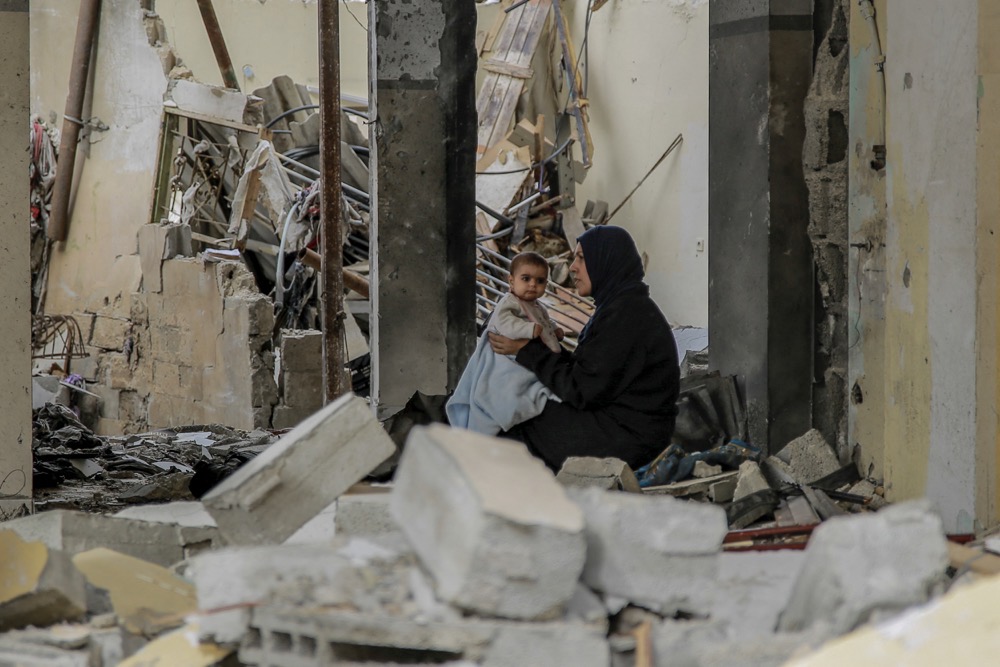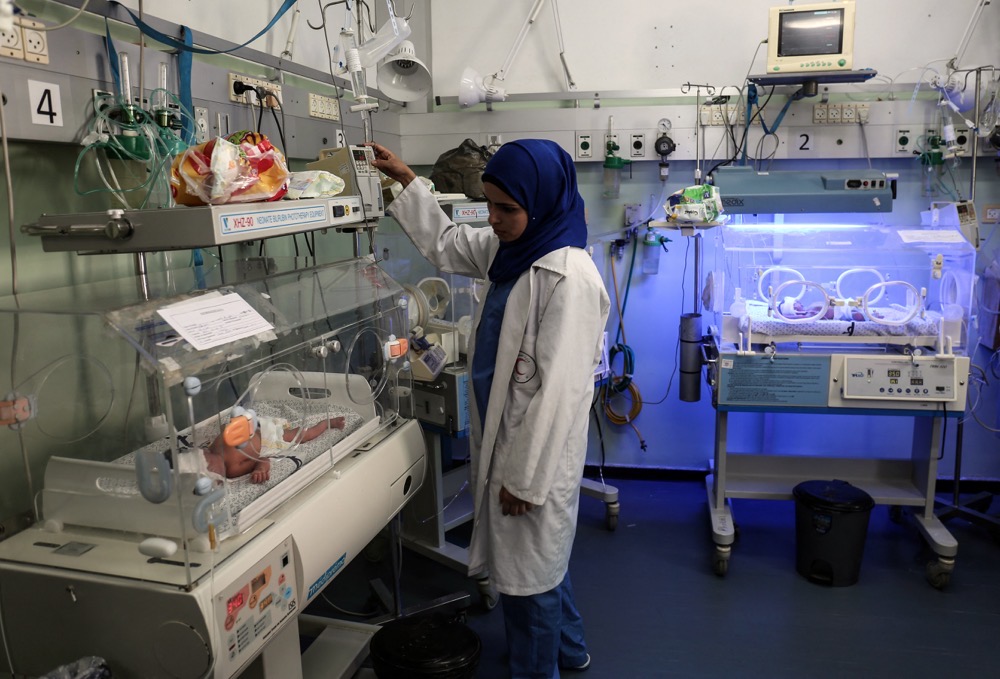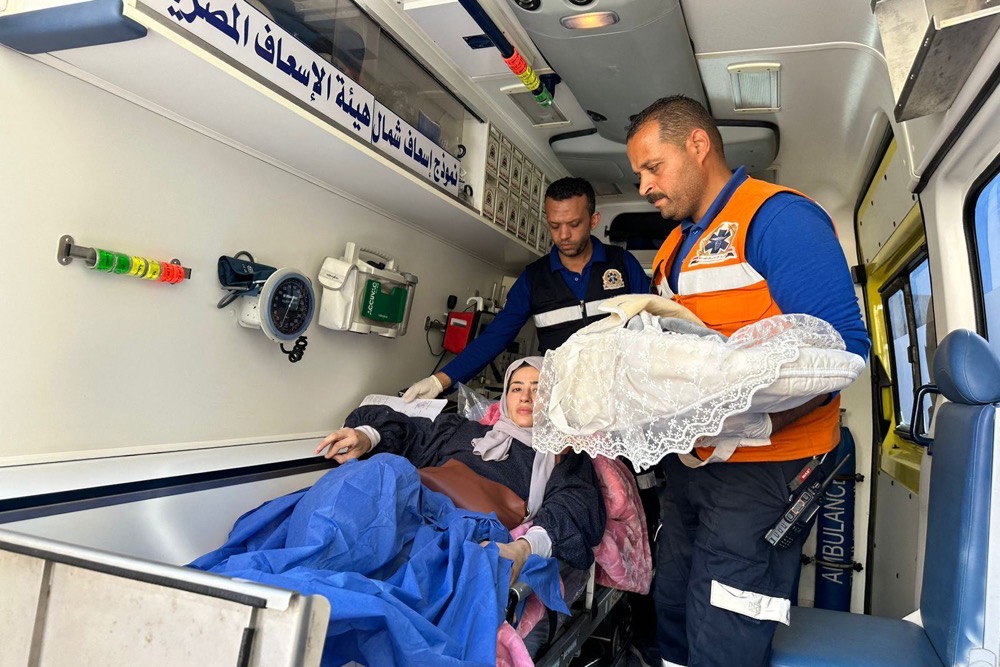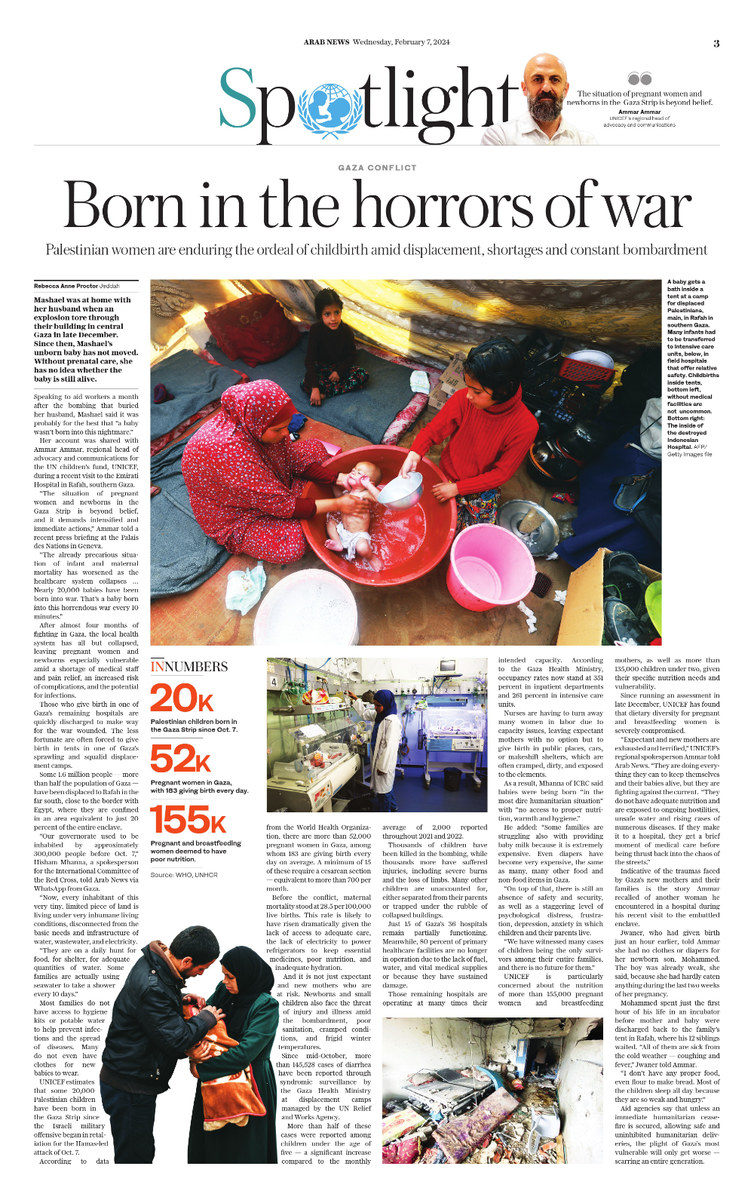JEDDAH: Mashael was at home with her husband when an explosion tore through their building in central Gaza in late December. Since then, Mashael’s unborn baby has not moved. Without prenatal care, she has no idea whether the baby is still alive.
Speaking to aid workers a month after the bombing that buried her husband, Mashael said it was probably for the best that “a baby wasn’t born into this nightmare.”
Her account was shared with Ammar Ammar, regional head of advocacy and communications for the UN children’s fund, UNICEF, during a recent visit to the Emirati Hospital in Rafah, southern Gaza.
“The situation of pregnant women and newborns in the Gaza Strip is beyond belief, and it demands intensified and immediate actions,” Ammar told a recent press briefing at the Palais des Nations in Geneva.

Some 1.6 million people — more than half the population of Gaza — have been displaced to Rafah in the far south. (AFP)
“The already precarious situation of infant and maternal mortality has worsened as the healthcare system collapses … Nearly 20,000 babies have been born into war. That’s a baby born into this horrendous war every 10 minutes.”
After almost four months of fighting in Gaza, the local health system has all but collapsed, leaving pregnant women and newborns especially vulnerable amid a shortage of medical staff and pain relief, an increased risk of complications, and the potential for infections.
Those who give birth in one of Gaza’s remaining hospitals are quickly discharged to make way for the war wounded. The less fortunate are often forced to give birth in tents in one of Gaza’s sprawling and squalid displacement camps.
Some 1.6 million people — more than half the population of Gaza — have been displaced to Rafah in the far south, close to the border with Egypt, where they are confined in an area equivalent to just 20 percent of the entire enclave.
“Our governorate used to be inhabited by approximately 300,000 people before Oct. 7,” Hisham Mhanna, a spokesperson for the International Committee of the Red Cross, told Arab News via WhatsApp from Gaza.
“Now, every inhabitant of this very tiny, limited piece of land is living under very inhumane living conditions, disconnected from the basic needs and infrastructure of water, wastewater, and electricity.

After almost four months of fighting in Gaza, the local health system has all but collapsed. (AFP)
“They are on a daily hunt for food, for shelter, for adequate quantities of water. Some families are actually using seawater to take a shower every 10 days.”
Most families do not have access to hygiene kits or potable water to help prevent infections and the spread of diseases. Many do not even have clothes for new babies to wear.
UNICEF estimates that some 20,000 Palestinian children have been born in the Gaza Strip since the Israeli military offensive began in retaliation for the Hamas-led attack of Oct. 7.
According to data from the World Health Organization, there are more than 52,000 pregnant women in Gaza, among whom 183 are giving birth every day on average. A minimum of 15 of these require a cesarean section — equivalent to more than 700 per month.
Before the conflict, maternal mortality stood at 28.5 per 100,000 live births. This rate is likely to have risen dramatically given the lack of access to adequate care, the lack of electricity to power refrigerators to keep essential medicines, poor nutrition, and inadequate hydration.

Poor sanitation and a cold winter have added to the dire conditions faced by babies and new mothers during the war. (AFP)
And it is not just expectant and new mothers who are at risk. Newborns and small children also face the threat of injury and illness amid the bombardment, poor sanitation, cramped conditions, and frigid winter temperatures.
Since mid-October, more than 145,528 cases of diarrhea have been reported through syndromic surveillance by the Gaza Health Ministry at displacement camps managed by the UN Relief and Works Agency.
More than half of these cases were reported among children under the age of 5 — a significant increase compared to the monthly average of 2,000 reported throughout 2021 and 2022.
Thousands of children have been killed in the bombing, while thousands more have suffered injuries, including severe burns and the loss of limbs. Many other children are unaccounted for, either separated from their parents or trapped under the rubble of collapsed buildings.
Just 15 of Gaza’s 36 hospitals remain partially functioning. Meanwhile, 80 percent of primary healthcare facilities are no longer in operation due to the lack of fuel, water, and vital medical supplies or because they have sustained damage.
FASTFACTS
• 20k Palestinian children born in the Gaza Strip since Oct. 7.
• 50k Pregnant women in Gaza, with 180 giving birth every day.
• 155k Pregnant and breastfeeding women deemed to have poor nutrition.
Source: WHO, UNHCR
Those remaining hospitals are operating at many times their intended capacity. According to the Gaza Health Ministry, occupancy rates now stand at 351 percent in inpatient departments and 261 percent in intensive care units.
Nurses are having to turn away many women in labor due to capacity issues, leaving expectant mothers with no option but to give birth in public places, cars, or makeshift shelters, which are often cramped, dirty, and exposed to the elements.
As a result, Mhanna of ICRC said babies were being born “in the most dire humanitarian situation” with “no access to proper nutrition, warmth and hygiene.”
He added: “Some families are struggling also with providing baby milk because it is extremely expensive. Even diapers have become very expensive, the same as many, many other food and non-food items in Gaza.

The maternal mortality rate — 28.5 per 100,000 live births pre-war — is likely to have risen dramatically given the lack of access to adequate care. (AFP)
“On top of that, there is still an absence of safety and security, as well as a staggering level of psychological distress, frustration, depression, anxiety in which children and their parents live.
“We have witnessed many cases of children being the only survivors among their entire families, and there is no future for them.”
UNICEF is particularly concerned about the nutrition of more than 155,000 pregnant women and breastfeeding mothers, as well as more than 135,000 children under 2, given their specific nutrition needs and vulnerability.
Since running an assessment in late December, UNICEF has found that dietary diversity for pregnant and breastfeeding women is severely compromised.
“Expectant and new mothers are exhausted and terrified,” UNICEF’s regional spokesperson Ammar told Arab News. “They are doing everything they can to keep themselves and their babies alive, but they are fighting against the current.
“They do not have adequate nutrition and are exposed to ongoing hostilities, unsafe water and rising cases of numerous diseases. If they make it to a hospital, they get a brief moment of medical care before being thrust back into the chaos of the streets.”

Pregnant women and newborns are especially vulnerable amid a shortage of medical staff and pain relief. (AFP)
Indicative of the traumas faced by Gaza’s new mothers and their families is the story Ammar recalled of another woman he encountered in a hospital during his recent visit to the embattled enclave.
Jwaner, who had given birth just an hour earlier, told Ammar she had no clothes or diapers for her newborn son, Mohammed. The boy was already weak, she said, because she had hardly eaten anything during the last two weeks of her pregnancy.
Mohammed spent just the first hour of his life in an incubator before mother and baby were discharged back to the family’s tent in Rafah, where his 12 siblings waited. “All of them are sick from the cold weather — coughing and fever,” Jwaner told Ammar.
“I don’t have any proper food, even flour to make bread. Most of the children sleep all day because they are so weak and hungry.”
Aid agencies say that unless an immediate humanitarian ceasefire is secured, allowing safe and uninhibited humanitarian deliveries, the plight of Gaza’s most vulnerable will only get worse — scarring an entire generation.




























